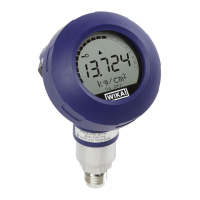6
WIKA operating instructions process transmitter, model UPT-2x
EN
14381795.02 04/2020 EN/DE/FR/ES
3. Commissioning
The process transmitter should only be commissioned and operated by skilled personnel.
The skilled personnel must have knowledge of ignition protection types, regulations and
provisions for equipment in hazardous areas.
DANGER!
Danger to life from explosion
Incorrect mounting and non-compliance with the contents of this chapter
can lead to a risk of explosion.
▶
Carefully read and comply with the following sub-chapters.
3.1 Mounting the process transmitter
DANGER!
Damaged diaphragm of the ush process connection
If the diaphragm is damaged, the explosion protection is no longer guaranteed.
Through any explosion resulting from this, there will be a high danger to life.
▶
Before commissioning, the diaphragm should be checked for visible
damage. Leaking fluid is indicative of damage.
▶
Protect the diaphragm from contact with abrasive media and against any
impacts.
3.2 Electrical installation
DANGER!
Danger to life from explosion
Incorrect mounting and non-compliance with the contents of this chapter
can lead to a risk of explosion.
▶
Carefully read and comply with the following sub-chapters.
Observe the information given in the type examination certicate and the country-specic
regulations for installation and use in hazardous areas (e.g. IEC 60079-14, NEC, CEC)
. If
this is not observed, serious injuries and damage could occur.
→ Type examination certicate is available for download at www.wika.com.
3.2.1 Requirements regarding intrinsic voltage supply
■
Power the process transmitter via an intrinsically safe circuit (Ex ia). Both the internal
capacitance and inductance must be considered (→ see chapter 6 “Specications”).
■
Provide the required voltage supply separation between Ex and non-Ex areas with a
certied isolated barrier or Zener barrier (suitable isolated barrier, model IS-Barrier).
■
For applications that require EPL Gb or Db, the power sup
ply and signal circuit should
have a protection level of “ib”. Then the interconnections and the transmitter will have
a protection level of II 2G Ex ib IIC T4/T5/T6 Gb or II 2D Ex ib IIIC T4/T5/T6 Db, even if
the process transmitter is marked otherwise (→ see EN 60079-14 section 5.4).
3. Commissioning

